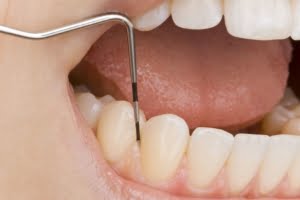Periodontal Treatments

Periodontitis is the technical term used to describe your gum and bone health. It begins as light inflammation and gets worse over time when it is left untreated. Luckily, maintaining a dedicated oral hygiene routine is the easiest way to deflect the symptoms of periodontitis. Otherwise, dental plaque encourages harmful bacteria to infect your teeth which can lead to bleeding gums, tooth loss, bad breath, receding gums, and shifting teeth. Periodontal treatments can be done with non-invasive measures like scaling, root planing, and topical or oral antibiotics.
After an initial diagnosis of periodontal disease, we will work with you to create a personalized treatment plan.
What Is the Oral-Systemic Link?
It’s frequently said that the mouth is the gateway to the body. More and more, medical professionals have been discovering just how true this really is. This is referred to as the oral-systemic link.
Dentists are often the first to detect conditions such as Crohn’s disease, diabetes, or cancer because the early symptoms may first show up in the mouth. Going in the other direction, we’re learning more and more how what happens in your mouth affects the health of the rest of your body.
The brain has the blood-brain barrier which protects it from toxins in the blood. In our mouths, there is a barrier between our gums and teeth and the rest of our body as well. In the case of periodontal disease, this barrier can break down and may cause disease or other problems in the rest of the body. Previously, it was thought that bacteria were the main factor in this, but more recent research has been indicating that inflammation may play a bigger role.
While the details of this connection between oral health and the health of the rest of the body is still being explored, it’s becoming increasingly clear that treating the inflammation of periodontal disease can help with the treatment of other inflammatory conditions (and, in some cases, vice versa).
Diseases with oral connections
Some conditions with strong connections to oral health include:
Diabetes – Gum disease can make diabetes harder to control, and diabetes can exacerbate gum disease. We explore the topic in more detail below.
Heart disease and stroke – Conditions causing chronic inflammation, such as periodontal disease, have connections to the likelihood of heart disease and stroke. Further down, we go into the topic in more detail.
Respiratory disease – The bacteria that grow in the mouth can find its way into the lungs as well. Respiratory diseases, such as pneumonia, can be caused by the same bacteria responsible for periodontal disease.
Cancer – According to the American Academy of Periodontology, those with periodontal disease were more likely to develop cancer than those without:
- 54% more likely to develop pancreatic cancer
- 49% more likely to develop kidney cancer
- 30% more likely to develop blood cancers
Other diseases that may be caused or complicated by oral infections include:
- IBS
- Breast cancer
- Prostate cancer
- Weight gain
- Alzheimer’s and dementia
- Low birth weight and premature birth
- Osteoporosis
- Rheumatoid arthritis
Some diseases can influence your oral health, as well, such as osteoporosis. Osteoporosis can lead to bone loss in the jaw which, in turn, can result in tooth loss, as there is no longer sufficient bone to support the teeth.
It’s critical to understand how important oral health truly is to our wellbeing, and to take it seriously in order to help prevent, or reduce the effects of other conditions.
Below, we’ll look at some of these conditions in a little more detail.









